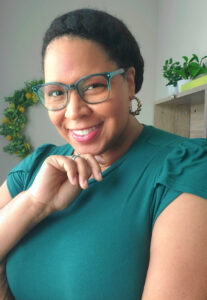IFLA #WLIC2023 attended not long ago. There’s been a lot of discussions regarding artificial intelligence in libraries but what else should LIS students, trainers, educators, workers, and associations focused on professional development think about? We spotlight professional development trainers and experts in librarianship to talk about their work. In this blog post, we interview Kaetrena Davis Kendrick.
Kaetrena Davis Kendrick, MSLS is a Researcher, Leader, Consultant and Coach. She earned her M.S.L.S. from the historic Clark Atlanta University School of Library and Information Studies. While known for her work on ethics, equity, diversity and inclusion, and communities of practice in libraries, Kendrick’s research on low-morale experiences in library workplaces is recognized as groundbreaking and validating for library employees at all levels. In her daily and long-term work, Kendrick has transformed library programs, services, and culture via creativity, leadership, and advocacy. She is committed to centering well-being, creativity, and empathy in the workplace and promoting career clarity and rejuvenation to workers. In 2019, Kendrick was named the Association of College and Research Libraries’ Academic/Research Librarian of the Year. Learn more about her work.
Thank you for taking the time to chat with us! Can you briefly tell us about your work and professional development interests?
Kaetrena: My pleasure! I’m a researcher, leader, consultant and coach focused on helping people and groups – library workers or library organizations particularly – recognize, reconcile, and recover from their low-morale experiences. My coaching and consulting services are research- and praxis-based and driven by my mission to inspire authentic collegiality, and to promote well-being, share the gifts of creativity, and cultivate empathetic, engaged leadership in the workplace. My professional development interests include assertive/interpersonal communication, leadership awareness/improvement, and employee engagement. My practicing career centers academic librarianship, so I’m also interested in communities of practice and student engagement and outreach.
What do you think are the challenges in engaging library staff in professional development activities?
Kaetrena: Library workers who experience low morale – which my research defines as repeated, protracted exposure to workplace abuse and neglect – generally note decreased interest in pursuing professional development, and they also indicate not being as motivated to connect with colleagues. Reduced funding, understaffing, decreased opportunities for stable and full-time employment, and burnout connected to (or exacerbated by) the global pandemic all have also increased these tenuous intersections of access to/ energy for continuing education and employee engagement.
What are some trends or areas in the LIS field for you?
Kaetrena: Awareness and research surrounding the deep emotional labor of library work continues to increase, and that’s very important, because for too long, the realities of our daily work – in all kinds of libraries – has been hidden by nostalgia of our users, as well by our own efforts to not disappoint our users or disturb that sense of nostalgia. The recognition and understanding of that emotional labor, in turn, is driving more conversations about how to advocate for library employees – not just collections, building, and technology. Additionally, I’m seeing trends in coaching as a methodology of support and professional development for library workers – I was happy to see IFLA’s session on coaching at this year’s WLIC.
What resources or opportunities would you like to share to highlight the professional development activities for the LIS community?
Kaetrena: Library associations like the Association of College & Research Libraries (ACRL) continue to offer excellent continuing education webinars, and CORE is also a great resource. E-learning platforms like WebJunction and Library Juice Academy are also places to browse – I’ll be leading or moderating sessions on navigating low morale later this month and next year, respectively. Don’t forget to mine other specialties, too! For instance, you don’t have to be an archivist or curator to benefit from the great offerings that archival and/or museum associations have. And be sure to attend the annual Conference on Academic Library Management – it’s free, virtual, and a great opportunity to learn from and connect with formal and informal library leaders focused on surfacing dignity and humaneness in college and university library workplaces. Books I often return to include:
- Critical Hope by Kari Grain
- Fostering Wellness in the Workplace: A Handbook for Libraries by Bobbi L. Newman
- Rest is Resistance by Tricia Hersey
Anything else you’d like to share that we didn’t get to talk about?
Kaetrena: If readers are experiencing low morale, professional development and continuing education are established countermeasures. Engaging in these activities will help you maintain a realistic perspective of your skillset, keep you connected outside of your immediate unhealthy workplace, and ensure you’re prepared for your next move to a better, more healthy organization. Also: keep in mind that professional development doesn’t just mean a class or a certificate – it can be coaching (considering and reflecting on, and taking action as a result of impactful questions aren’t just for our users – they’re for you, too!)
